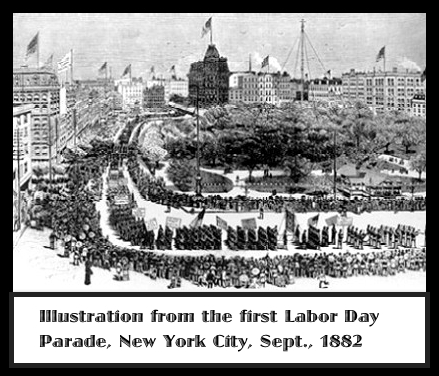While most Americans view Labor Day as the last long weekend of the summer and another day off work, the history behind the holiday was actually a result of one of the most intense and violent struggles for workers’ rights.
In 1894, during a time of severe economic and social unrest, thousands of workers at the Pullman Palace Car Company went on strike to protest the way George Pullman, founder and president of the Pullman Palace Car Company, treated his workers. Pullman was one of the wealthiest men in the Chicago area, and subjected his workers to high rents and low pay in the company town he had built for them near the factory. His actions forced many of his workers into debt and poverty. When his workers rebelled and went on strike with the support of Eugene Debs and the American Railway Union, Pullman gained the support of President Grover Cleveland, who ordered federal troops to intervene—leading to a bloody confrontation and the deaths of more than 30 Pullman workers. Soon afterwards and amid growing criticism to the brutal response to the striking workers, President Cleveland established Labor Day as a national holiday in an effort to appease organized labor.
One hundred and twenty-one years after the Pullman Strike, our country is still grappling with economic and social unrest as income inequality persists and the right of workers to stick together for better workplace conditions continues to be challenged. Too many American workers are struggling to survive in low-wage, part-time jobs that hamper their ability to move up the economic ladder. And the sheer desperation of many Americans who simply want to work has enabled many companies to cut wages and hours, misclassify workers as independent contractors or hire temporary workers to avoid providing benefits, subject their workers to erratic scheduling practices, and punish those who speak out for better workplace conditions.
Many of these abuses are a direct result of the smaller number of unionized workers. Fortunately, America’s workers are realizing that the key to economic prosperity for working people is power in numbers. Across the country, thousands of low-wage, part-time workers are leading the fight to narrow the wealth gap by sticking together for better wages and benefits. Like the Pullman workers, they are standing up to their wealthy employers through strikes and protests in the face of threats and intimidation. Some have even lost their jobs in their fight for a voice on the job. Despite these setbacks, they continue to call attention to our country’s increasing reliance on low-wage, part-time jobs and its devastating effect on American workers.
This Labor Day, let’s take time to remember those before us who stood up to powerful corporate and political interests to fight for a better life and a more equitable society. Let’s honor them by focusing on the power we all have to define a brighter path forward for the millions of workers and their families who deserve and have earned a better life.


